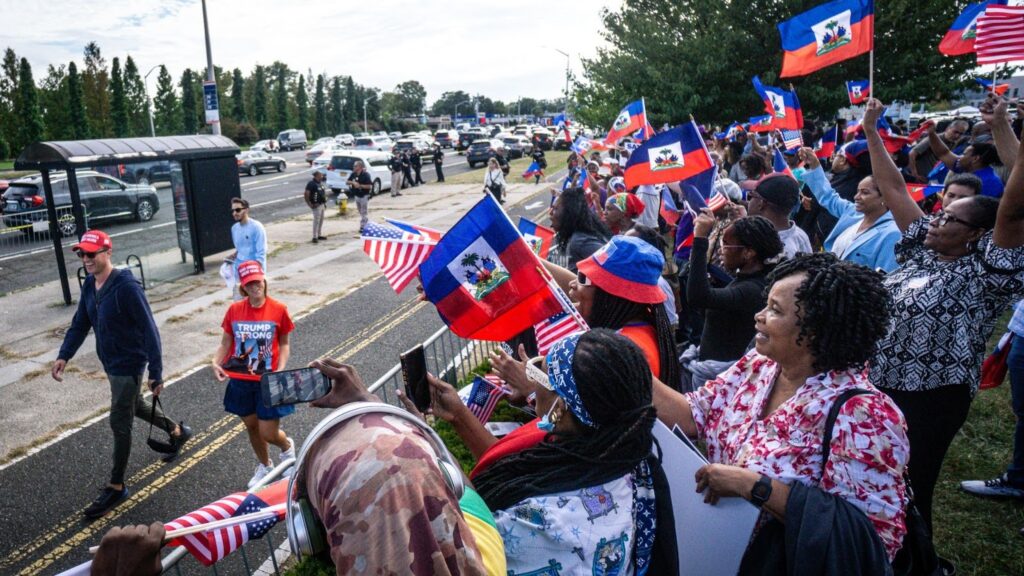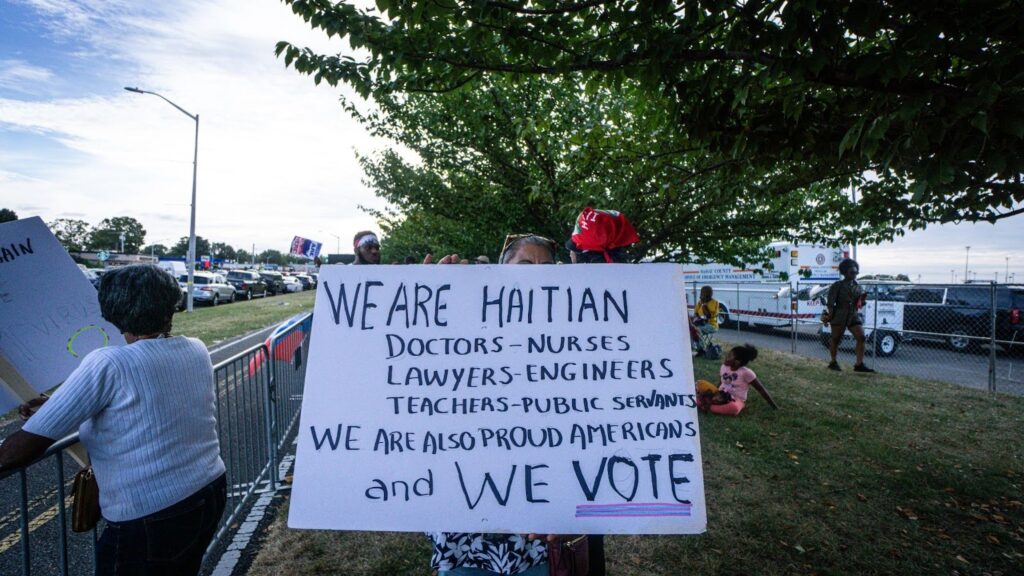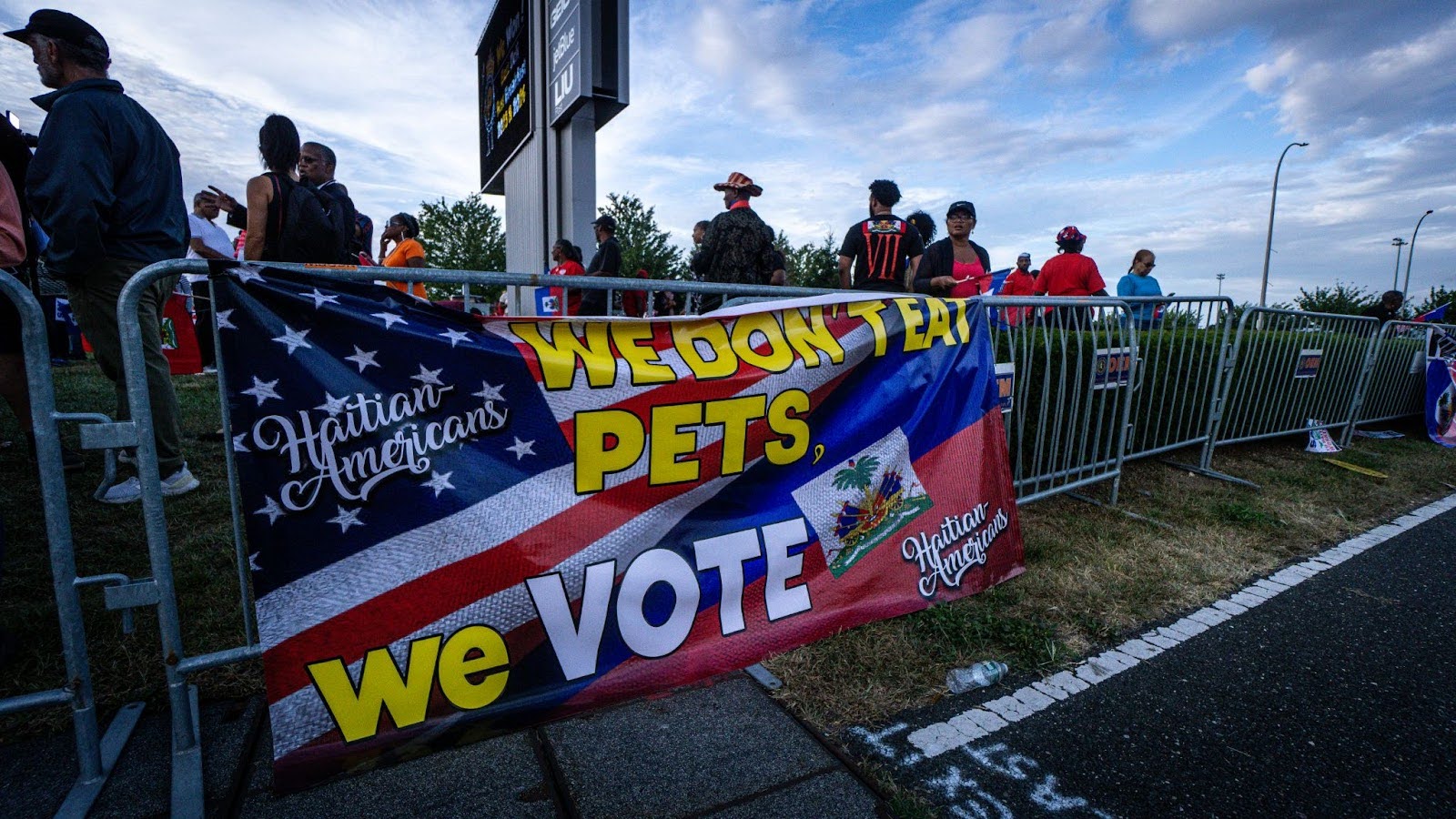Former President Donald Trump hosted a rally in Uniondale, Long Island on Sept. 18th — just three days after a second failed assassination attempt.
As thousands of Long Island residents poured into the Nassau Veterans Memorial Coliseum in support of the former president, the Haitian-American community of Long Island gathered in front of the arena in protest. The protest drew a coalition of leaders from Long Island’s Muslim, Jewish, and Christian communities who stood in solidarity with the Haitian American community.
“We don’t eat pets, we vote,” read a banner draped on the metal crowd control barriers. The counter-protestors waved both Haitian and American flags side by side, and the powerful rhythm of the Haitian drum, the tanbou, reverberated alongside chants saying, “Stop the lies,” throughout the evening.
“We are American! We Are American! Make no mistakes about it. Come November, we will vote,” said New York State Assembly Member Eudson Tyson Francois, the first Haitian-American Democratic nominee for District 97. Francois is also a former Spring Valley trustee and police commissioner. On the opposite side of the barrier, men and women donning bright red shirts with “Trump Strong” printed on them chuckled at the counter-protesters, giving them a thumbs down.

Since September, rumors have spread about Haitian immigrants eating pets in Springfield, Ohio. Despite these claims being debunked, Trump further perpetuated this disinformation:
“In Springfield, they’re eating the dogs, the people that came in, they’re eating the cats,” Trump said during ABC’s Sept. 10th presidential debate with Kamala Harris. A day earlier, Trump’s running mate J.D Vance posted on X, “Months ago, I raised the issue of Haitian illegal immigrants draining social services and generally causing chaos all over Springfield, Ohio. Reports now show that people have had their pets abducted and eaten by people who shouldn’t be in this country. Where is our border czar?”
Although there is no evidence of immigrants stealing and eating pets in Springfield, there have been multiple threats of violence in the city since the disinformation surfaced, showing the real-life implications of such viral rumors. The Haitian immigrants of Springfield have legally protected status in the U.S.
“I represent a strong Haitian-American community, Elmont and Valley Stream, and when I heard, I was devastated because I knew that it would have a significant impact,” said Nassau County Legislator Carrié Solages.
Solages, the first Haitian-American legislator to be elected in Nassau County, expressed the concerns he has received from his constituents about the impact that this disinformation would have on the Haitian-American community in Nassau County.
“Concerns that their children will be the target of constant bullying, negative attention, being accused of being animal eaters,” Solages said, “now we have to define ourselves. That’s what racism does. [It] is a devastating occurrence in our national politics. He’s stepping on the neck of a Haitian community just to stand higher.”
“I can tell you that the International Human Rights Commission will always stand and fight for your rights. Not just here, but in the United Nations as well,” said Dr. Malik Nadeem Abid, secretary general of the International Human Rights Commission. “I can tell you that we all stand strongly in solidarity with you. Last time Mr. Trump announced the Muslim ban. This time he’s going to announce the Black ban. It’s not going to happen. Only we can fight, and only if we fight, we are going to win. He’s going to keep doing it. To Chinese and Jewish and all other minorities, my dear brothers and sisters, we are not going to let this happen.”

Dr. Louis Auguste, a co-organizer of the coalition protest, emphasized the importance of the Haitian-American community in Long Island:
“It’s a very important community. You have a very large population here, in Baldwin, Elmont […] it’s full of hardworking Haitians,” said Auguste. “You have nurses, doctors, engineers, lawyers, a range of people working there, contributing to the economy here, contributing to the society, and then to come here in our turf to insult us. That’s really not acceptable.”
For the Haitian-American community in Long Island, the protest was not just about countering the unfounded rumors that targeted them, but also reclaiming their voice and political agency in the face of political hostility. Their message was clear: they will not be silenced.











